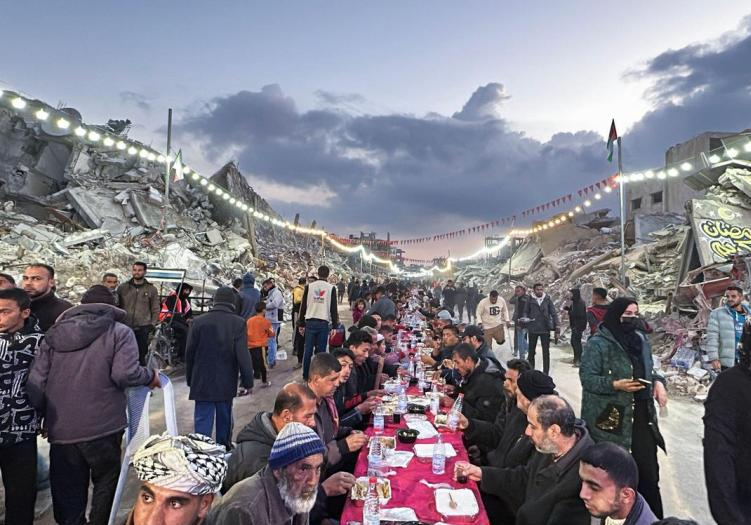
"If there is a second phase of the ceasefire, the Israeli government could fall." The analysis pointed out that domestic political factors are one of the key reasons for Israeli Prime Minister Benjamin Netanyahu's reluctance to launch the second phase of the ceasefire. Finance Minister Oleksandr Smotrich, the leader of the far-right faction in the governing coalition, has threatened to quit the government if the war is not resumed.
(Cairo/Jerusalem) - The first phase of the ceasefire between Israel and Hamas expired on Saturday, with Israel announcing that it had accepted a US proposal to extend the agreement until the middle of next month and Hamas insisting on a second phase of the truce, with peace talks deadlocked again.
The Israeli Prime minister's office said in a statement Sunday that because the two sides need more time to reach a permanent cease-fire, Trump's Middle East envoy Wittkov proposed extending the first phase of the cease-fire until the middle of next month to cover the Islamic holy month of Ramadan, which ends Saturday. And the Jewish holiday of Passover, which ends on April 20. In addition, if the agreement is extended for 42 days without a result of negotiations, Israel can resume military operations in Gaza with a US guarantee.
The statement added that on the day the extension takes effect, Hamas will release about 29 Israeli hostages, including survivors and bodies; The remaining hostages will be released after a permanent ceasefire is agreed. This comes after the two sides completed the last batch of hostage and prisoner exchanges in the first phase of the ceasefire agreement on Thursday (February 27). Some 59 Israeli hostages remain, 34 of whom are presumed dead.
Hamas has explicitly refused to extend the first phase of the ceasefire. Hamas official Ahmed al-Mardawi said on Sunday: "The only way to achieve regional stability and the return of prisoners is to fully implement the agreement, starting with the launch of phase two." This includes a permanent ceasefire, complete withdrawal, reconstruction, and the release of prisoners through mutually agreed agreements. That is our clear position."
The Israeli prime minister's office threatened further "consequences" if Hamas continued to refuse to extend the ceasefire. Later, Israel announced the suspension of humanitarian aid and commercial supplies to the Gaza Strip.
According to the original agreement, Hamas will start negotiations for the release of the remaining Israeli hostages in the second stage, and Israeli troops will withdraw from Gaza, and eventually promote the end of the war. Delegations from the United States, Israel and Qatar have been negotiating the second phase of the deal in Cairo since last week, but have been unable to make progress. According to two Palestinian officials familiar with the matter, Israel has refused to initiate the second phase of the agreement or discuss it.
The analysis pointed out that domestic political factors are one of the key reasons for Israeli Prime Minister Benjamin Netanyahu's reluctance to launch the second phase of the ceasefire. Finance Minister Bezalel Smotrich, the leader of the far-right faction in the ruling coalition, has threatened to quit the government if the war is not resumed.
"If there is a second phase of the ceasefire, the Israeli government could collapse," said Horowitz, head of security consultancy Le Beck International. "Hamas doesn't want to continue to delay phase one, but it doesn't really have the ability to force Israel into phase two," said Max Rodenbeck, an analyst with the International Crisis Group.
Amid the stalled negotiations, the United States announced Saturday night that it would sell Israel nearly $3 billion worth of weapons, including bombs and demolition tools. This is the second time in nearly a month that the Trump administration has approved emergency arms sales to Israel, totaling nearly $12 billion. U.S. Secretary of State Marco Rubio said he had used emergency authority to speed up military aid to Israel and pledged to "use all available tools" to ensure Israel's security, including addressing potential threats.

The United States announced on Monday its commitment to provide 1.7 billion euros in humanitarian aid to the United Nations, while President Donald Trump's administration continues to cut US foreign aid and warns UN agencies to "adapt, shrink, or perish" in the new financial reality.
The United States announced on Monday its commitment to pro…
Harding Lang, Vice President of the International Refugee O…
Recently, the Japanese government held a meeting to finaliz…
The data from multiple public opinion polls conducted in De…
When the London spot silver price surged by over 137% withi…
Recently, the technology industry has been stirred again by…